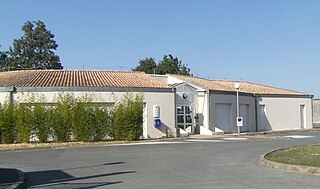
Unemployment, according to the OECD, if persons above a specified age not being in paid employment or self-employment but currently available for work during the reference period.

Jobcentre Plus is the part of the Department for Work and Pensions which delivers working-age support service in the United Kingdom.
IR35 refers to the United Kingdom's anti-avoidance tax legislation designed to tax 'disguised' employment at a rate similar to employment. In this context, "disguised employees" means workers who receive payments from a client via an intermediary, for example, their own limited company, and whose relationship with their client is such that had they been paid directly they would be employees of the client.
CareerBuilder is an employment website founded in 1995 and with offices in the United States, Canada, Europe, and Asia. In 2008, it had the largest market share among online employment websites in the United States, where it was founded. CareerBuilder.com provides labor market intelligence, talent management software, and other recruitment solutions, including online career search services for more than 1,900 partners as of March 2008, including 140 newspapers and portals such as AOL and MSN.

The Institut Supérieur de Logistique Industrielle (ISLI), or Institute for Supply Chain Excellence as it is called in English, is the Supply Chain Management academic department and research center of KEDGE Business School and located in Talence, France, in the suburb area of Bordeaux. All of its programs are accredited by the Chartered Institute of Procurement & Supply.
Saudization, officially known as Saudi nationalization scheme, or Nitaqat, is the newest policy of the Kingdom of Saudi Arabia implemented by its Ministry of Labor and Social Development, whereby Saudi companies and enterprises are required to fill up their workforce with Saudi nationals up to certain levels.
JobStreet.com is a job portal founded in 1997. Founded in Malaysia, it is now Southeast Asia's largest online employment company, according to Forbes. It currently serves about 80000 corporate customers and 11 million jobseekers. Even as early as in July 2010, the Group services over 60,000 corporate customers and over 7 million jobseekers.
Naukri.com is an Indian job portal operating in India and Middle East founded in March 1997. Naukri.com was founded by Indian businessman Sanjeev Bikhchandani, who started Info Edge (India) Ltd. in 1995. As of Dec 2016 Naukri.com had a database of about 49.5 million registered job seekers and an average of about 15,000 resumes were added daily while about 130,000 resumes were modified daily during the Fiscal year 2013–14. During the Fiscal year 2013–14, 51,000 corporate customers paid Naukri.com for services like database access, job postings, advertising / listing on the site amongst others.
The domestic policy of the Nicolas Sarkozy administration was led by François Fillon's government as soon as the president was elected, and the government appointed by the president. According to the French constitution, the government and the Prime Minister "determine and conduct the policy of the nation", that is to say, deal with the domestic policy, while the President of the Republic focuses on foreign relations. However, a modification of the constitution in 2001 shortened the presidential mandate from seven to five years, so that the presidency lasts the same time as the government's mandate. Therefore, the president can be more implicated in the governmental policy. It was the case with Nicolas Sarkozy, who has been accused of being a "hyper-president" by his opponents. François Fillon appeared as too much submitted to the president.

Pôle emploi is a French governmental agency which registers unemployed people, helps them find jobs and provides them with financial aid. The agency was created in 2009, resulting from the merger between the ANPE and the ASSEDIC. The agency employs 45,000 civil servants. The merger had been expected for a very long time, for the two agencies had been created more than forty years before.
UNEDIC is the acronym of "Union nationale interprofessionnelle pour l’emploi dans l’industrie et le commerce". It was created in 1958. Until 2009, it was an agency of the French government which provided unemployed people with social benefits. In 2009, it was merged with the ANPE into the newly created agency Pôle emploi, and was turned into an independent association.

Assédic is the partial acronym of "Association pour l’emploi dans l’industrie et le commerce". Created in 1958, it was a French agency that collected and paid unemployment insurance contributions. It was associated with the UNEDIC agency, which set the amount of the contributions. In 2009, it was merged with the ANPE into the new agency Pôle emploi.
JobSerf, Inc. was an employment service and job search outsourcing (JSO) company. It was founded in 2004 by three Dallas executives; Jay Martin, Phil Miller and David Micek. Jay Martin is a former Strategy and Supply Chain Consultant who worked for Arthur D.Little, IBM and PepsiCo. Phil Miller is a Dallas-based Financial Executive and former CFO. David Micek has been a CEO of multiple companies, and was also the President of internet leader AltaVista. In 2004, JobSerf was the first company to demonstrate the feasibility of job search outsourcing, and the pioneer in the job search outsourcing industry.

Djene Kaba Condé is the current First Lady of Guinea since 2010 and the wife of the President of Guinea, Alpha Condé. She has three children.

Unemployment in the United Kingdom is measured by the Office for National Statistics and in the three months to May 2017 the headline unemployment rate stood at 4.5%, or 1.49 million people. This is a reduction in unemployed people of 152,000 from a year earlier, and is the lowest jobless rate since 1975. The ONS said the employment rate, or percentage of people in work for those aged between 16 and 64, was 74.9% for the three months to May. This is the highest employment rate since comparable records began in 1971. There were 32.01 million people in work, 324,000 more than a year earlier.
The Fair Employment Practice Committee (FEPC) was created in 1941 in the United States to implement Executive Order 8802 by President Franklin D. Roosevelt "banning discriminatory employment practices by Federal agencies and all unions and companies engaged in war-related work." That was shortly before the United States entered World War II. The executive order also required federal vocational and training programs to be administered without discrimination. Established in the Office of Production Management, the FEPC was intended to help African Americans and other minorities obtain jobs in home front industries during World War II. In practice, especially in its later years, the Committee also tried to open up more skilled jobs in industry to minorities, who had often been restricted to lowest-level work. The FEPC appeared to have contributed to substantial economic improvements among black men during the 1940s by helping them gain entry to more skilled and higher-paying positions in defense-related industries.
Unemployment insurance in France was first established in 1958. Benefits and contributions are set by the independent body called UNEDIC which is controlled equally by Trade Unions and Employer associations. Unemployment benefits are paid only to those persons who fulfill certain requirements.
Public plans for energy efficient refurbishment are put in place by states to encourage building owners to renovate their properties in a way that increases their energy performance. As financing represents the most important obstacle to this type of renovation, the plans favour financial incentives in the form of loans or grants. Various institutions can be involved in the process, such as ministries, banks, firms, or energy services companies (ESCOs).
The rate of youth unemployment in South Korea fluctuated in the 9–11% range between 2001 and 2014. It was above 10% in 2018 and down to 7.1% by the end of 2019 - the lowest level since 2011.

Florence Granjus is a French politician representing La République En Marche! She was elected to the French National Assembly on 18 June 2017, representing the Yvelines's 12th constituency.








